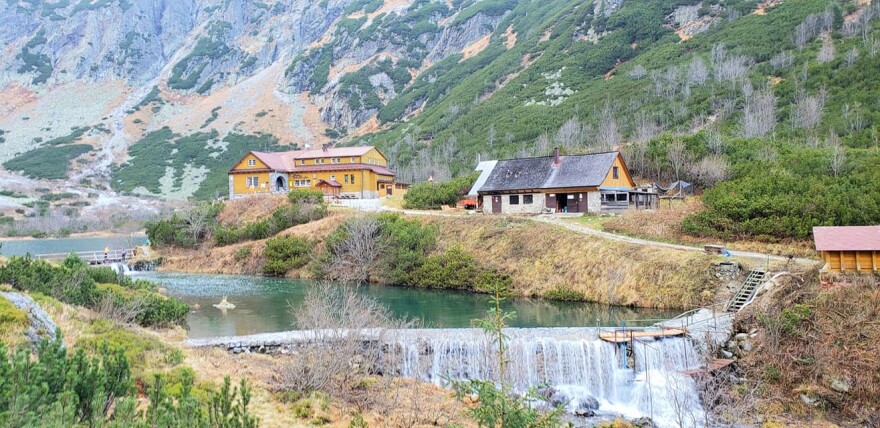What’s your ideal vacation?
For many it includes traveling to a popular destination for a once in a lifetime experience. While there, they try to cram in every tourist hotspot and activity into one week, because otherwise, they’d have no other time in the year to do it.
But for a growing number of people, their ideal vacation is one cut off from other people, typically secluded in nature, with little to no tourist activities or distractions.
This new trend in travel is called the “quiet vacation”.

A post-pandemic search to restore ourselves
These vacations are often characterized by spending time alone, in off-the-beaten-path locations, predominantly surrounded by nature. Wi-fi is sparse, if available at all, and distractions from the everyday are left at home.
“There's a concept in emotion research called ideal affect, which is this measure we can take of how do you want to feel, what's your ideal?” said Sarah Pressman, professor of psychological science at UC Irvine. “And in the US and in a lot of Western countries, the ideal is high energy. Excitement.”
So why are so many people moving away from high energy vacations?
-
Nonprofit's launching fundraiser to keep it afloat
-
USC study documents what residents want from trees
-
What candidates can — and can't — say they do
Pressman suggests it may be due to increasing stress levels, potentially exacerbated by the pandemic.
“What this is probably evidence of is that we are not restoring right now in a way that maybe we used to be able to,” Pressman said. The pandemic work structure, the post-pandemic hybrid work model, and even our constant use of phones, has made it so that people never truly feel that they are off from work.
Pressman also noted the mental health toll that social media and the constant news cycle can have, adding to feelings of constant stress.
“Even when you're at home, you're not actually resting,” she said.
The health benefits of a “quiet vacation”
Respite from daily life has many different physical, mental, and spiritual benefits.
Pressman has studied the benefits of vacations and leisure, with one study showing that people who take more time off have overall better health, with those people showing signs of having decreases in metabolic syndrome, a cluster of physical symptoms tied to worse health. Vacations can also reduce people’s risk of cardiovascular events, according to Pressman.
“We've even seen reduced stress reactivity, reduced heart rate and blood pressure after taking vacations,” she said.
The trend of quiet vacations in particular, can offer unique benefits to one’s mental health and emotional well-being. Their focus on nature and emphasis on solitude can lend people space and time to self-reflect and de-stress.

Studies have shown that spending time in nature not only reduces stress but can change stress hormones, and improve people’s cognitive functions, such as attention, said Pressman.
“I think the benefit there is twofold from these quiet vacations, because if you go there and you get the benefits of nature, but you're also cutting off the source of your stress by not checking your emails, worrying about work, worrying about what you're missing, and you're actually able to disengage,” Pressman said.
A growing industry for quiet vacationers
Disengaging into nature is exactly what Jon Staff had in mind when he created Getaway, which offers small cabins outside major cities across the United States for these types of quiet vacations.
“Our need, as a people, is to have more balance in our lives,” Staff said. “To get away from the noisy city, to get away from our stressful jobs, to be free even of our messy apartments.”
Staff said quiet vacations also offer people an opportunity to reflect on their lives. Away from distractions, people finally have time to check-in on themselves.
At Getaway, visitors put their phones in lock boxes and are encouraged to immerse themselves in the surrounding nature.
“It's really hard in our modern world with bosses constantly pushing new deadlines on us, with digital distractions interrupting almost every moment of the day,” Staff said. “It is very difficult in that context to stop, take a breath, and really check in with ourselves and what we need.”
Staff said even carving out a day or two of free time to pull ourselves away from distractions of daily life can have so much power in helping us appreciate our lives more.
Sahara Rose De Vore, founder and CEO of the Travel Coach Network, said that travel, especially solo travel, is a “powerful tool for things like self discovery, transformation, healing, and personal development.”
She thinks the rising trend in people using vacations to disconnect from the world and reconnect with themselves is part of a larger pattern of people being more intentional with their vacation time.
How to plan a quiet vacation alone
For those interested in taking a quiet vacation, De Vore recommended looking at smaller cities or towns just outside of major hubs. If seeking a quiet vacation abroad, this allows you to fly into a major airport and then take an inexpensive bus or train ride to your more remote location. The same goes for locations in your own state.
De Vore also suggested picking places that have a nature feature.
“I personally like places where there's bodies of water, so lots of nature, whether there is hiking or there is a lake or a pond,” said De Vore. “The beach is very healing for me, just the power of blue spaces.”

When traveling alone, it’s important to remain aware of your surroundings, De Vore said. Solo travelers should keep an eye on their valuables and essentials. De Vore said to always keep your ID, phone, and charger on you — in case your luggage is stolen you have the necessities.
Although part of quiet vacations is to disconnect, De Vore recommended, at least when traveling to a new location, to update a family member or friend and give them estimated times of arrival or departure.
If you're planning a quiet vacation with a partner, De Vore said to make sure you discuss what you want to get out of the vacation as individuals.
“Finding a balance within there so that when you do go on this quiet vacation, there's not the stress or the expectations or the pressure of having to sacrifice what you want to do or not do what you want to do all the time just because someone else has another activity in mind,” De Vore said. ”But it starts with you really understanding one another's needs and desires and your intentions for this trip.”
But what if you don’t have time for a full vacation or even a long weekend?
Pressman said that the practices and effects of “quiet vacations” can be achieved even in everyday leisure time. The idea of removing the source of your stress or disconnecting from social media or work, can apply no matter where you are or what you’re doing.
“Mindfulness and other forms of meditation are huge benefits to reducing stress and improving your health, and just giving our brains a break from the constant multitasking and noise,” Pressman said.







